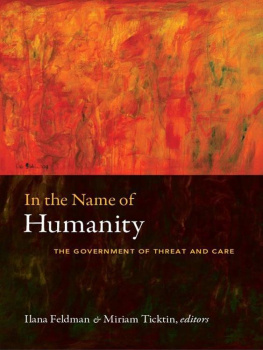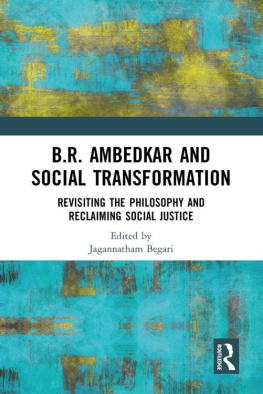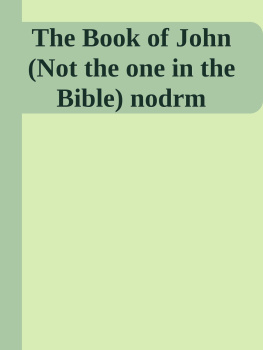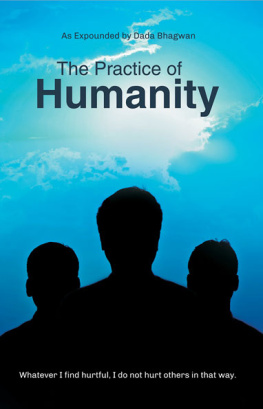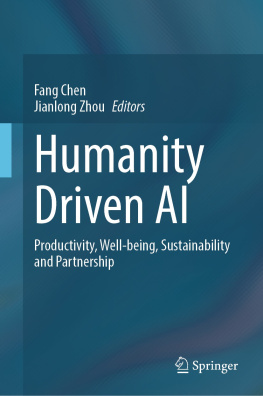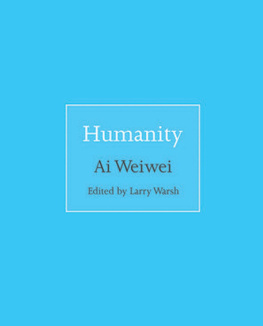Unknown - In the Name of Humanity
Here you can read online Unknown - In the Name of Humanity full text of the book (entire story) in english for free. Download pdf and epub, get meaning, cover and reviews about this ebook. year: 2010, publisher: Duke University Press, genre: Politics. Description of the work, (preface) as well as reviews are available. Best literature library LitArk.com created for fans of good reading and offers a wide selection of genres:
Romance novel
Science fiction
Adventure
Detective
Science
History
Home and family
Prose
Art
Politics
Computer
Non-fiction
Religion
Business
Children
Humor
Choose a favorite category and find really read worthwhile books. Enjoy immersion in the world of imagination, feel the emotions of the characters or learn something new for yourself, make an fascinating discovery.
In the Name of Humanity: summary, description and annotation
We offer to read an annotation, description, summary or preface (depends on what the author of the book "In the Name of Humanity" wrote himself). If you haven't found the necessary information about the book — write in the comments, we will try to find it.
Unknown: author's other books
Who wrote In the Name of Humanity? Find out the surname, the name of the author of the book and a list of all author's works by series.
In the Name of Humanity — read online for free the complete book (whole text) full work
Below is the text of the book, divided by pages. System saving the place of the last page read, allows you to conveniently read the book "In the Name of Humanity" online for free, without having to search again every time where you left off. Put a bookmark, and you can go to the page where you finished reading at any time.
Font size:
Interval:
Bookmark:
Duke University Press DURHAM & LONDON 2010
2010 Duke University Press
All rights reserved
Printed in the United States of America on acid-free paper
Designed by Jennifer Hill
Typeset in Garamond Premier Pro by Achorn International
Library of Congress Cataloging-in-Publication Data appear on the last printed page of this book.
Duke University Press gratefully acknowledges the University of Michigan Womens Studies Department, which provided funds toward the publication of this book.

THE ORIGINS of this volume lie in our experience teaching a class together called Government and Humanity while we were in the Columbia Society of Fellows in the Humanities from 2002 to 2004. We are grateful for opportunities this fellowship provided. We are also indebted to the wonderful students whose thoughtful and generous engagement with the course made us want to spend many more years pondering the relationship between government and humanity. The first step in developing our ongoing conversations into a collection of essays was the convening of a workshop in April 2005 at the Kevorkian Center for Near Eastern Studies at New York University. We thank the centers staff for their generous assistance with all the logistics. We also thank the NYU Humanities Council, the University of Connecticut Human Rights Institute, and, at the University of Michigan, the Office of the Vice Provost of Research, the International Institute, the Womens Studies Program, and the Department of Anthropology for crucial financial support for the workshop and the book project. If a great class made us first think of compiling a book, a fantastic workshop convinced us that this project was worth pursuing. We are tremendously grateful to all the participants for such stimulating discussions. In addition to the contributors to this book, paper givers and discussants included Samera Esmeir, Tom Keenan, Emily Martin, Timothy Mitchell, and Hugh Raffles.
As we have worked to develop the volume, we are indebted to Rob Blecher and Andrew Zimmerman for helpful comments on the introduction. A number of research assistants have provided invaluable assistance in pulling together the volume. Our deepest thanks go to Julienne Obadia, Carol Wang, Emily Sekine, Giovanna Fischer, and Marie Cour. We also thank Jake Kosek and two other reviewers for Duke University Press for their careful readings and tremendously helpful comments on the entire manuscript. Without Ken Wissokers interest, there would be no book. Also at Duke, Courtney Berger, Leigh Barnwell, and Tim Elfenbein were always helpful and patient.

Government and Humanity
WHAT DOES IT MEAN to claim humanity as your political constituency? What is it to govern, fight, and care in the name of humanity? These are the questions that this volume grapples with. Surveying the contemporary political scene one finds humanity mobilized in a remarkable array of circumstances. Whether considering the challenge of global environmental destruction, the ethics of scientific research on stem cells, or the identification of genocide and other atrocities, activists on all sides of the issues know that a claim to speak on behalf of humanity stakes out a powerful position. It is one of the few categories that is meaningful across political, religious, and social divides. While people may disagree on the source of its power, almost everyone agrees that humanity should be considered sacred. As a universal subject, the claims of humanity should, it seems, be paramountand to speak on its behalf should bring discussion to a close, permit action to begin, and enable lives to be saved. And yet, the meaning of humanity is not as clear as its widespread appearance in political and ethical discourse might suggest. The call to humanity often does not have the intended clarifying effects. There are simply too many understandings of humanity for it to be the final word.
When everyone speaks in the name of humanity, no one can monopolize its meaning. In the debate over stem cell research, for instance, both advocates and opponents speak of saving lives and of protecting the sacredness of humanity. Opponents argue that research on stem cells derived from human embryos violates the sanctity of human life in the name of research; supporters argue that refusing to allow such research condemns humanity to further disease, suffering, and death. This debate remains unsettled, though recent technological advances suggest that the issue may be resolved by the possibility of creating stem cells without humanity. Humanity not only means many different things, its meanings are often contradictory. Environmental conservation efforts can, by displacing people and constricting their livelihoods, clash with the rights claims of local populations, and each can claim to pursue the good of humanity (Veit and Benson 2004; Alley and Meadows 2004). In other words, by identifying certain peoples as the source of environmental degradation, and by understanding environmental degradation as a threat to the future of humanity, conservationists mayin the name of humanitythreaten the basic human rights of local populations to live and to choose their own livelihood.
Similarly, human rights and humanitarian perspectives on how best to protect human life can mandate conflicting courses of action. This conflict is abundantly clear in the debate about what to do about the profoundly tragicand highly contestedsituation in the Darfur region of Sudan. After the outbreak of conflict in 2003, human rights activists called for military intervention to save Darfur, to stop what they identify as genocide. Humanitarian workers, in contrast, warned of the catastrophic effects of military action on their ability to deliver relief. They believed that more lives would be lost in the intervention because it would render the presence of humanitarian workers impossible, threatening humanitarian neutrality and aid workers lives. All parties to this debate, and many others like it, speak for humanity.
Faced with what sometimes seems a cacophony of competing voices it is tempting to dismiss humanity as an empty signifiera category that claims universal relevance and to encompass all human beings, but which in fact is so historically, geographically, and politically situated as to have no meaning beyond its particular instantiations. In this volume, however, we take a different approach. In exploring the importance of universalist claims in making humanity an effective category, we are not principally interested in proving that such claims are in fact particular. While such debunking work is often important, and claims to encompass every person and experience should not be simply accepted at face value, our project here is to explore the effects of the claim-making itself. In so doing, we consider what Anna Tsing (2005: 6) has termed the sticky engagements of universal categories. It is through such engagements, through friction, Tsing suggests, that universals become practically effective even as they never fulfill their promises of universality (8). The capacity of humanity to govern so much of the contemporary political and ethical imaginary, and to have such demonstrable and significant effects on peoples lives, is the product of a deployment of universals.
In this collection we bring together essays that consider the configurations of humanity in three different arenashumanitarianism and human rights, biological technologies, and humans and natureeach of which offers a distinct perspective on this problem. We choose these sites not only to highlight the diversity of spaces and scales at which humanity is articulated but to show that humanity gains its power in the intersection of these different areas. The chapters illuminate the range of governing practices that have been crucial to the production of humanity across a global field. The universalist claims and practicesabout justice, about bodily integrity, and about the meaning of the natural worldthat fill out the category of humanity are given concrete expression in governmental arrangements that rely on notions of humanity as their foundation.
Font size:
Interval:
Bookmark:
Similar books «In the Name of Humanity»
Look at similar books to In the Name of Humanity. We have selected literature similar in name and meaning in the hope of providing readers with more options to find new, interesting, not yet read works.
Discussion, reviews of the book In the Name of Humanity and just readers' own opinions. Leave your comments, write what you think about the work, its meaning or the main characters. Specify what exactly you liked and what you didn't like, and why you think so.

